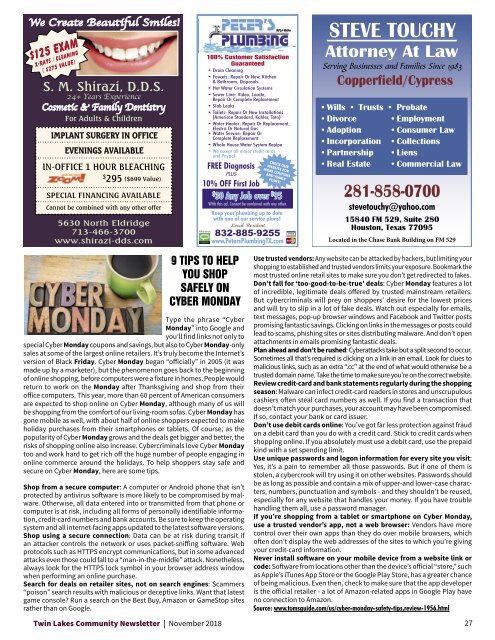Twin Lakes November 2018
Create successful ePaper yourself
Turn your PDF publications into a flip-book with our unique Google optimized e-Paper software.
We Create Beautiful Smiles!<br />
$125 Exam<br />
X-Rays / Cleaning<br />
( $275 Value)<br />
S. M. Shirazi, D.D.S.<br />
24+ Years Experience<br />
Cosmetic & Family Dentistry<br />
For Adults & Children<br />
IMPLANT SURGERY IN OFFICE<br />
EVENINGS AVAILABLE<br />
IN-OFFICE 1 HOUR BLEACHING<br />
$<br />
295 ($699 Value)<br />
SPECIAL FINANCING AVAILABLE<br />
Cannot be combined with any other offer<br />
5630 North Eldridge<br />
713-466-3700<br />
www.shirazi-dds.com<br />
9 TIPS TO HELP<br />
YOU SHOP<br />
SAFELY ON<br />
CYBER MONDAY<br />
Type the phrase “Cyber<br />
Monday” into Google and<br />
you’ll find links not only to<br />
special Cyber Monday coupons and savings, but also to Cyber Monday-only<br />
sales at some of the largest online retailers. It’s truly become the Internet’s<br />
version of Black Friday. Cyber Monday began “officially” in 2005 (it was<br />
made up by a marketer), but the phenomenon goes back to the beginning<br />
of online shopping, before computers were a fixture in homes. People would<br />
return to work on the Monday after Thanksgiving and shop from their<br />
office computers. This year, more than 60 percent of American consumers<br />
are expected to shop online on Cyber Monday, although many of us will<br />
be shopping from the comfort of our living-room sofas. Cyber Monday has<br />
gone mobile as well, with about half of online shoppers expected to make<br />
holiday purchases from their smartphones or tablets. Of course, as the<br />
popularity of Cyber Monday grows and the deals get bigger and better, the<br />
risks of shopping online also increase. Cybercriminals love Cyber Monday<br />
too and work hard to get rich off the huge number of people engaging in<br />
online commerce around the holidays. To help shoppers stay safe and<br />
secure on Cyber Monday, here are some tips.<br />
Shop from a secure computer: A computer or Android phone that isn’t<br />
protected by antivirus software is more likely to be compromised by malware.<br />
Otherwise, all data entered into or transmitted from that phone or<br />
computer is at risk, including all forms of personally identifiable information,<br />
credit-card numbers and bank accounts. Be sure to keep the operating<br />
system and all internet-facing apps updated to the latest software versions.<br />
Shop using a secure connection: Data can be at risk during transit if<br />
an attacker controls the network or uses packet-sniffing software. Web<br />
protocols such as HTTPS encrypt communications, but in some advanced<br />
attacks even those could fall to a “man-in-the-middle” attack. Nonetheless,<br />
always look for the HTTPS lock symbol in your browser address window<br />
when performing an online purchase.<br />
Search for deals on retailer sites, not on search engines: Scammers<br />
“poison” search results with malicious or deceptive links. Want that latest<br />
game console? Run a search on the Best Buy, Amazon or GameStop sites<br />
rather than on Google.<br />
<strong>Twin</strong> <strong>Lakes</strong> Community Newsletter | <strong>November</strong> <strong>2018</strong><br />
STEVE TOUCHY<br />
Attorney At Law<br />
Serving Businesses and Families Since 1983<br />
Copperfield/Cypress<br />
• Wills • Trusts • Probate<br />
• Divorce • Employment<br />
• Adoption • Consumer Law<br />
• Incorporation • Collections<br />
• Partnership • Liens<br />
• Real Estate • Commercial Law<br />
281-858-0700<br />
stevetouchy@yahoo.com<br />
15840 FM 529, Suite 280<br />
Houston, Texas 77095<br />
Located in the Chase Bank Building on FM 529<br />
Use trusted vendors: Any website can be attacked by hackers, but limiting your<br />
shopping to established and trusted vendors limits your exposure. Bookmark the<br />
most trusted online retail sites to make sure you don’t get redirected to fakes.<br />
Don’t fall for ‘too-good-to-be-true’ deals: Cyber Monday features a lot<br />
of incredible, legitimate deals offered by trusted mainstream retailers.<br />
But cybercriminals will prey on shoppers’ desire for the lowest prices<br />
and will try to slip in a lot of fake deals. Watch out especially for emails,<br />
text messages, pop-up browser windows and Facebook and Twitter posts<br />
promising fantastic savings. Clicking on links in the messages or posts could<br />
lead to scams, phishing sites or sites distributing malware. And don’t open<br />
attachments in emails promising fantastic deals.<br />
Plan ahead and don’t be rushed: Cyberattacks take but a split second to occur.<br />
Sometimes all that’s required is clicking on a link in an email. Look for clues to<br />
malicious links, such as an extra “.cc” at the end of what would otherwise be a<br />
trusted domain name. Take the time to make sure you’re on the correct website.<br />
Review credit-card and bank statements regularly during the shopping<br />
season: Malware can infect credit-card readers in stores and unscrupulous<br />
cashiers often steal card numbers as well. If you find a transaction that<br />
doesn’t match your purchases, your account may have been compromised.<br />
If so, contact your bank or card issuer.<br />
Don’t use debit cards online: You’ve got far less protection against fraud<br />
on a debit card than you do with a credit card. Stick to credit cards when<br />
shopping online. If you absolutely must use a debit card, use the prepaid<br />
kind with a set spending limit.<br />
Use unique passwords and logon information for every site you visit:<br />
Yes, it’s a pain to remember all those passwords. But if one of them is<br />
stolen, a cybercrook will try using it on other websites. Passwords should<br />
be as long as possible and contain a mix of upper-and lower-case characters,<br />
numbers, punctuation and symbols - and they shouldn’t be reused,<br />
especially for any website that handles your money. If you have trouble<br />
handling them all, use a password manager.<br />
If you’re shopping from a tablet or smartphone on Cyber Monday,<br />
use a trusted vendor’s app, not a web browser: Vendors have more<br />
control over their own apps than they do over mobile browsers, which<br />
often don’t display the web addresses of the sites to which you’re giving<br />
your credit-card information.<br />
Never install software on your mobile device from a website link or<br />
code: Software from locations other than the device’s official “store,” such<br />
as Apple’s iTunes App Store or the Google Play Store, has a greater chance<br />
of being malicious. Even then, check to make sure that the app developer<br />
is the official retailer - a lot of Amazon-related apps in Google Play have<br />
no connection to Amazon.<br />
Source: www.tomsguide.com/us/cyber-monday-safety-tips,review-1956.html<br />
27

















